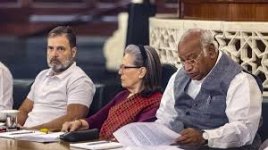The Congress party, which has been out of power in Gujarat for the last 30 years, is now trying to strengthen its organisation from the ground up. As part of this effort, the All India Congress Committee (AICC) appointed observers to oversee the selection of District Congress Committee (DCC) presidents in 41 districts. This move was part of a pilot project believed to be the idea of Rahul Gandhi, the Leader of the Opposition in Lok Sabha. Each team included one AICC observer and four Gujarat Pradesh Congress Committee (GPCC) observers. After visiting their assigned districts and meeting local leaders, these observers submitted their reports to the party high command, highlighting several major problems within the state unit. One of the biggest issues mentioned in these reports is the demoralisation of party workers. Many workers feel neglected by the central leadership, which they say has not paid enough attention to Gujarat. Because of this, workers have felt directionless and have started leaving the party. The lack of strong support and motivation from the top leadership has made it hard for local units to stay active and confident.
Another serious concern raised is the alleged closeness of some Congress leaders to the BJP and RSS. Observers reported that they were shown photos and other pieces of evidence showing Congress leaders working with or having business ties to BJP leaders. Even Rahul Gandhi had raised this issue earlier during a visit to Ahmedabad, saying that 20-30 such people could be removed if needed. These links have raised doubts about the loyalty of some leaders within the party. The reports also point to deep-rooted factionalism in the Gujarat Congress. Observers said that while many people still believe in the party’s ideology and history, internal fights between different groups have made it difficult to work together, especially at the grassroots level. This internal competition has weakened the organisation and discouraged dedicated workers.
Another issue is weak campaigning. In the 2022 Assembly elections, the Congress won only 17 out of 182 seats, down from 77 in 2017. Observers noted that many candidates didn’t show much energy during campaigning. Local leaders said this was because of a lack of funds and proper guidance from the top. Many areas had very few Congress workers on the ground, even during election time.
The reports also mention the hostile behaviour of the local police and administration towards Congress workers. Observers said that police harassment is making it difficult for workers to stay active. Some leaders even stopped organising small meetings due to fear of trouble from authorities. This fear has hurt the party’s presence at the block and district levels.
Lastly, observers noted that the party’s frontal organisations like the Indian Youth Congress, NSUI, and Mahila Congress are missing from action. These groups usually play a key role in protests and public outreach, but in Gujarat, they have almost disappeared from the ground.
These reports have given a clear message to the Congress high command — if the party wants to bounce back in Gujarat, it needs strong leadership, unity, and active support at all levels.
Another serious concern raised is the alleged closeness of some Congress leaders to the BJP and RSS. Observers reported that they were shown photos and other pieces of evidence showing Congress leaders working with or having business ties to BJP leaders. Even Rahul Gandhi had raised this issue earlier during a visit to Ahmedabad, saying that 20-30 such people could be removed if needed. These links have raised doubts about the loyalty of some leaders within the party. The reports also point to deep-rooted factionalism in the Gujarat Congress. Observers said that while many people still believe in the party’s ideology and history, internal fights between different groups have made it difficult to work together, especially at the grassroots level. This internal competition has weakened the organisation and discouraged dedicated workers.
Another issue is weak campaigning. In the 2022 Assembly elections, the Congress won only 17 out of 182 seats, down from 77 in 2017. Observers noted that many candidates didn’t show much energy during campaigning. Local leaders said this was because of a lack of funds and proper guidance from the top. Many areas had very few Congress workers on the ground, even during election time.
The reports also mention the hostile behaviour of the local police and administration towards Congress workers. Observers said that police harassment is making it difficult for workers to stay active. Some leaders even stopped organising small meetings due to fear of trouble from authorities. This fear has hurt the party’s presence at the block and district levels.
Lastly, observers noted that the party’s frontal organisations like the Indian Youth Congress, NSUI, and Mahila Congress are missing from action. These groups usually play a key role in protests and public outreach, but in Gujarat, they have almost disappeared from the ground.
These reports have given a clear message to the Congress high command — if the party wants to bounce back in Gujarat, it needs strong leadership, unity, and active support at all levels.

